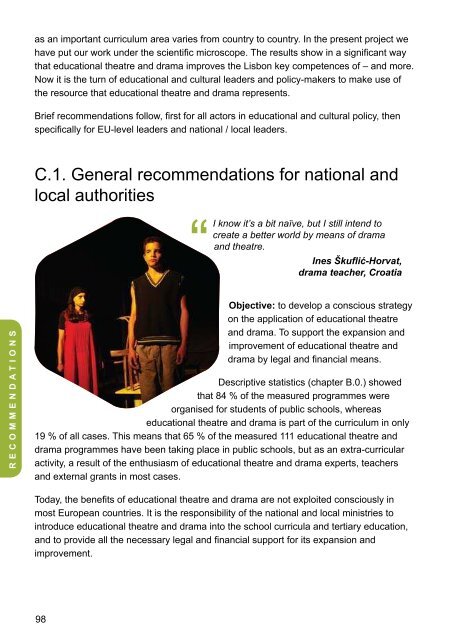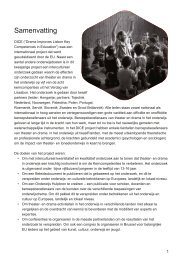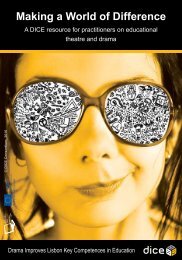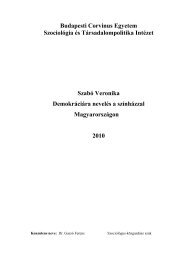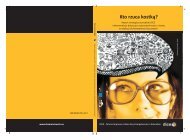Policy Paper - Drama Improves Lisbon Key Competences in Education
Policy Paper - Drama Improves Lisbon Key Competences in Education
Policy Paper - Drama Improves Lisbon Key Competences in Education
You also want an ePaper? Increase the reach of your titles
YUMPU automatically turns print PDFs into web optimized ePapers that Google loves.
as an important curriculum area varies from country to country. In the present project we<br />
have put our work under the scientific microscope. The results show <strong>in</strong> a significant way<br />
that educational theatre and drama improves the <strong>Lisbon</strong> key competences of – and more.<br />
Now it is the turn of educational and cultural leaders and policy-makers to make use of<br />
the resource that educational theatre and drama represents.<br />
Europe 2020, Europe’s current lead<strong>in</strong>g long-term strategy also specifies what national<br />
governments need to do to strengthen fields such as educational theatre and drama,<br />
under the responsibilities of the Member States:<br />
Flagship Initiative: “Youth on the move”<br />
Brief recommendations follow, first for all actors <strong>in</strong> educational and cultural policy, then<br />
specifically for EU-level leaders and national / local leaders.<br />
C.1. General recommendations for national and<br />
local authorities<br />
At national level, Member States will need:<br />
• To ensure efficient <strong>in</strong>vestment <strong>in</strong> education and tra<strong>in</strong><strong>in</strong>g systems at all levels<br />
(pre-school to tertiary);<br />
• To improve educational outcomes, address<strong>in</strong>g each segment (pre-school,<br />
primary, secondary, vocational and tertiary) with<strong>in</strong> an <strong>in</strong>tegrated approach,<br />
encompass<strong>in</strong>g key competences and aim<strong>in</strong>g at reduc<strong>in</strong>g early school leav<strong>in</strong>g;<br />
Flagship Initiative: “An agenda for new skills and new jobs”<br />
“<br />
I know it’s a bit naïve, but I still <strong>in</strong>tend to<br />
create a better world by means of drama<br />
and theatre.<br />
Ines Škuflić-Horvat,<br />
drama teacher, Croatia<br />
At national level, Member States will need:<br />
• To ensure that the competences required to engage <strong>in</strong> further learn<strong>in</strong>g and the<br />
labour market are acquired and recognised throughout general, vocational,<br />
higher and adult education, <strong>in</strong>clud<strong>in</strong>g non formal and <strong>in</strong>formal learn<strong>in</strong>g;<br />
Recommendations<br />
Objective: to develop a conscious strategy<br />
on the application of educational theatre<br />
and drama. To support the expansion and<br />
improvement of educational theatre and<br />
drama by legal and f<strong>in</strong>ancial means.<br />
Descriptive statistics (chapter B.0.) showed<br />
that 84 % of the measured programmes were<br />
organised for students of public schools, whereas<br />
educational theatre and drama is part of the curriculum <strong>in</strong> only<br />
19 % of all cases. This means that 65 % of the measured 111 educational theatre and<br />
drama programmes have been tak<strong>in</strong>g place <strong>in</strong> public schools, but as an extra-curricular<br />
activity, a result of the enthusiasm of educational theatre and drama experts, teachers<br />
and external grants <strong>in</strong> most cases.<br />
Today, the benefits of educational theatre and drama are not exploited consciously <strong>in</strong><br />
most European countries. It is the responsibility of the national and local m<strong>in</strong>istries to<br />
<strong>in</strong>troduce educational theatre and drama <strong>in</strong>to the school curricula and tertiary education,<br />
and to provide all the necessary legal and f<strong>in</strong>ancial support for its expansion and<br />
improvement.<br />
Our recommendations for national / local authorities cover three areas: the school<br />
system, tertiary education and fund<strong>in</strong>g & legislation.<br />
“<br />
“<br />
I am a pupil at Kjøkkelvik school and we are tak<strong>in</strong>g part <strong>in</strong> a project called<br />
”DICE”. One hour a week, we are us<strong>in</strong>g other methods of learn<strong>in</strong>g, and<br />
<strong>in</strong>stead of hav<strong>in</strong>g so much theory, we work with stuff orally, so that we learn<br />
how to express ourselves. We learn more because it is more fun than sitt<strong>in</strong>g<br />
beh<strong>in</strong>d a desk and writ<strong>in</strong>g. Perhaps we could have it like this permanently,<br />
once a week?<br />
Cel<strong>in</strong>e Eriksen, Norwegian student, 14 years old - Letter to the editor,<br />
Bergens Tidende, Monday February 15 th , 2010<br />
I th<strong>in</strong>k the project significantly contributed to pupils’ openness, helped them<br />
to improve their self-expression skills (not just the verbal, but the non-verbal<br />
communication too). In comparison with the pupils from other classes, the<br />
participants of the project easily dist<strong>in</strong>guish themselves because of the<br />
eas<strong>in</strong>ess of communication (with other pupils, with the teachers), because<br />
of their assertiveness and <strong>in</strong>itiative regard<strong>in</strong>g extra-curricular projects.<br />
Introduc<strong>in</strong>g a drama course <strong>in</strong>to the national curriculum would be beneficial.<br />
Liliana Zaschievici, Head teacher, Bucharest, Romania<br />
Recommendations<br />
98<br />
99


